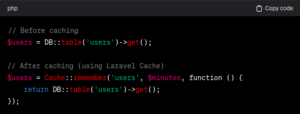Being a web development freelancer, constructing and scaling Laravel app can be both exciting and difficult. Laravel is a widespread PHP framework for creating web applications. Once your project starts growing, scaling becomes an essential issue. In this blog post, we’ll explore some practical strategies for scaling Laravel applications and provide a suitable example to illustrate these concepts.
1) Optimizing Database Queries
The database tends to be one of the main challenges in scaling Laravel apps. Poor performance might result in inefficient searches, which can negatively affect user experience. Freelancers must optimize database queries.

You can improve performance by reducing the amount of data fetched from the database by choosing only the necessary columns. Optimized database interactions can also result from effectively using Laravel’s Eloquent ORM.
2) Caching for Performance
You can enhance your Laravel application speed a lot by implementing caching mechanisms, especially with common requests. Caching data allows you to reduce data generation for every request hence improving response times.

Here, ‘users’ data is cached for a fixed period to allow all subsequent requests to fetch the data from the cache and not execute the database query again.
3) Load Balancing
This approach will improve the performance and reliability of your Laravel application as the incoming traffic is distributed across more than one server. Load balancing balances the burden on different servers so that there are not too many requests to one server.
Example: Just imagine a traffic spike on your Laravel application because of a marketing campaign. Load balancing is another tool that you can use to balance the load on a single server and ensure a faster response time.
4) Queue Management
Use the integrated work queues in Laravel to complete difficult tasks simultaneously. This guarantees that background-executable programs do not hinder the execution of crucial user requests.

In this instance, the task ‘ProcessUserTask’ can run in the background, enabling the main application to react quickly to user requests.
5) Using Eloquent Relationships Wisely
Use Laravel’s eloquent relationships to obtain relevant data quickly and efficiently without putting an impact on performance. When obtaining records, eager load relationships to avoid the ‘N+1’ query problem.

Compared to individual inquiries for users and their posts, this returns users along with the posts that are linked with them in a more efficient manner.
In conclusion, scaling Laravel applications is a vital aspect of ensuring the success and sustainability of your freelance projects. By optimizing your code, fine-tuning your database queries, implementing load balancing, etc. you lay the foundation for a robust and scalable Laravel application.
When taking on Laravel scaling, it is advisable that you use platforms designed to empower developers in their projects. Zunction is an online platform which is dedicated to the developers of Laravel. In this place, you will be able to find a place to communicate, resources, and connect with like-minded professionals.










